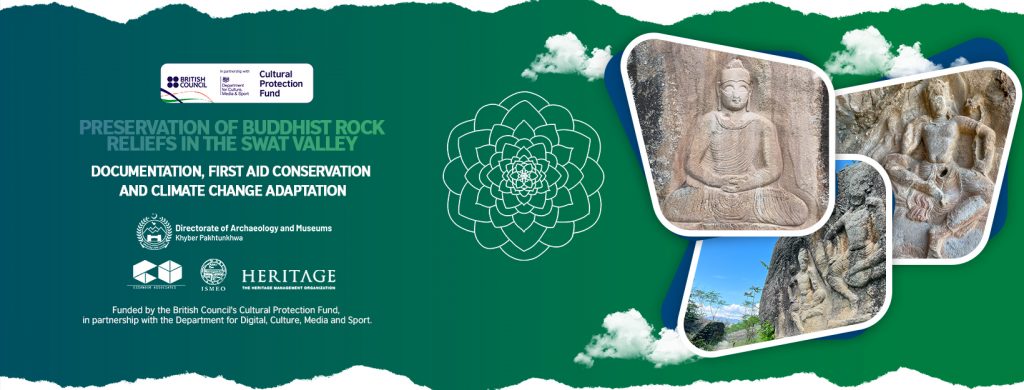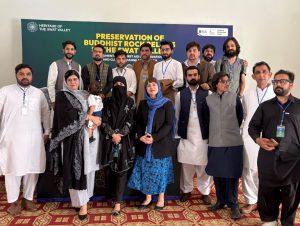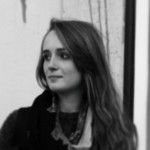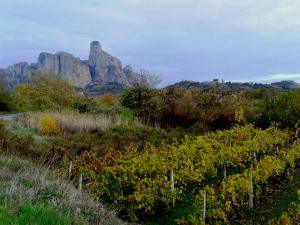: Climate Change and Monuments
Milestone project to preserve Buddhist Heritage in Pakistan completes phase 1
 HERITΛGE is proud to announce the completion of the first phase of the ‘Preservation of Buddhist Rock Reliefs in the Swat Valley: Documentation, First Aid Conservation, and Climate Change Adaptation‘ project, realised in collaboration with EssaNoor Associates, the Directorate of Archaeology and Museums KP, and the Italian Archaeological Mission in Pakistan, and made possible thanks to the support of the British Council’s Cultural Protection Fund.
HERITΛGE is proud to announce the completion of the first phase of the ‘Preservation of Buddhist Rock Reliefs in the Swat Valley: Documentation, First Aid Conservation, and Climate Change Adaptation‘ project, realised in collaboration with EssaNoor Associates, the Directorate of Archaeology and Museums KP, and the Italian Archaeological Mission in Pakistan, and made possible thanks to the support of the British Council’s Cultural Protection Fund.
Swat Valley in northern Pakistan is home to some of the most significant remnants of the ancient Gandhara civilization. Among these are Buddhist rock reliefs and inscriptions, likely carved in the 7th or 8th century BC, which are now under threat from natural erosion, human activity, and the escalating impacts of climate change.
In response to these emerging challenges, the project adopted a multi-phase strategy encompassing digital documentation, emergency conservation, local capacity development, sustainable tourism, and climate resilience initiatives.
Through extensive field surveys, the project digitally recorded 78 Buddhist rock reliefs using high-resolution photography, 3D scanning, and interactive geographic mapping. Emergency stabilization measures were also carried out at several vulnerable sites, providing necessary ‘first aid’ to prevent further deterioration. A major milestone was the launch of the project website, which offers free access to 3D models, maps, and comprehensive documentation of these heritage sites. The platform supports research, education, and site management while promoting global engagement with Swat’s rich cultural heritage.
The local communities and institutions were engaged throughout the project to raise awareness and empower them to become custodians of these invaluable heritage sites through grassroots discussions and workshops. Thirteen heritage professionals and seven local community members were trained in digital preservation skills to ensure that the knowledge and tools for conserving the heritage are sustained locally, empowering the community to manage and protect their own cultural resources. The project also recorded six oral testimonies, preserving the intangible heritage of the local community. These stories reflect the lasting impact of Buddhist influence in the Swat Valley, highlighting traditional crafts like Gandharan wooden art, stone masonry, and shawl embroidery, which have been inspired by centuries of Buddhist heritage.
In addition to heritage conservation, the project identified sustainable tools for both preservation and economic development. The development of hiking trails and eco-tourism facilities was proposed to promote local tourism and provide sustainable income for rural communities. Alternative livelihoods through eco-tourism, local crafts, and medicinal plant cultivation are also encouraged by the initiative that aims to ensure economic stability in the region.
Closing Ceremony
 The Swat Museum hosted a project closing event on 15 April 2025, attended by approximately 200 people, including students, heritage practitioners, local community representatives, and international experts. The ceremony included a presentation by project team, detailing the objectives and accomplishments, as well as the official launch of the website. A panel discussion, chaired by HERITΛGE’s Dr. Maja Kominko, gathered professionals from both the academic and grassroots communities. The panel addressed the cultural significance of Buddhist heritage in Swat, the significance of community participation in conservation, and the adaptation to the impacts of climate change on heritage.
The Swat Museum hosted a project closing event on 15 April 2025, attended by approximately 200 people, including students, heritage practitioners, local community representatives, and international experts. The ceremony included a presentation by project team, detailing the objectives and accomplishments, as well as the official launch of the website. A panel discussion, chaired by HERITΛGE’s Dr. Maja Kominko, gathered professionals from both the academic and grassroots communities. The panel addressed the cultural significance of Buddhist heritage in Swat, the significance of community participation in conservation, and the adaptation to the impacts of climate change on heritage.
The guests were guided through a thoughtfully curated exhibit showcasing the project’s key outputs, including photographic documentation, interactive maps, and 3D-models. Team members were present to explain the conservation methods employed throughout the project and to demonstrate the digital equipment used in the preservation process. The ceremony concluded with the presentation of shields and certificates to honor significant contributions. Project stakeholders and members of the public reaffirmed their commitment to safeguarding Swat’s cultural heritage for the benefit of future generations.
The ‘Preservation of Buddhist Rock Reliefs in the Swat Valley’ project underscores the increasing significance of integrating digital technologies, emergency conservation, community engagement, sustainable tourism, and climate resilience into contemporary heritage conservation practices. It also serves as a model for future initiatives aimed at safeguarding vulnerable cultural heritage sites.
For additional information and access to digital documentation, visit www.heritageofswatvalley.com.
IHC Interview with Sofia Lovegrove
From September until December 2013, an Archaeology graduate from Portugal joined the ranks of IHC and worked on a variety of projects including the Climate Change and the Monuments Project (which she also attended), the coordination of postgraduate students with the initiative and the planning of a Spring tour programme within the MA in Heritage Management, aimed at visiting heritage sites around Greece. In less than three months she accomplished a great deal and proved to be an invaluable ally to our initiative. Meet Sofia Lovegrove:
Tell us about yourself and your past experience:
I’m 22 years old and I did my undergraduate degree in Archaeology at the New University of Lisbon, Portugal. Before coming to Greece, I was (and in some cases, still am) involved in various excavations and research projects related to Archaeology and Cultural Heritage in Portugal, Morocco and the UK.
What makes you passionate about heritage management?
One of the things I am most passionate about is learning, especially about humans – our past, our present, what makes us human, about our different cultures, people and places, our biological evolution, and even the ways of functioning as biological and social beings. Thus I decided I wanted to become a researcher in Archaeology. I hope to one day be able to carry out my own projects and research and share the my discoveries with as many people as I can.
I believe that sharing is one of the most important tasks of the humanities research, since what we are studying and what we discover belongs to everyone – it is our heritage, our collective human experience. Heritage Management is the subject which encompasses all of the Cultural Heritage related subjects (History, Archaeology, Anthropology, etc.) by teaching us exactly how we can manage all the many features of tangible and intangible cultural heritage and how we can share this heritage with the general public. I am naturally inclined to be interested in these subjects since I wish to work in this field and be involved in Public Archaeology projects.
Tell us about your job or your studies before you come here:
Before participating in the internship at the IHC, I had completed an undergraduate degree in Archaeology at the New University of Lisbon in Portugal, as well as a first year of the MA in Archaeology. After a year, I quit that MA, finding that it was ultimately not fulfilling my goals and expectations. I decided to do a gap year in order to have new and enriching experiences related to Archaeology and Heritage, as well as completely unrelated ones, such as doing a Digital Photography Course and being involved in social work.
What are you doing at the moment?
Since I came back to Portugal at the beginning of 2014, I have been working as a translator for CHAIA, an Art History research center of the University of Évora in Portugal. I did a three-month digital photography course at the Portuguese Institute of Photography from February until April. During the last few weeks of April and part of May, I stayed in York in the UK where I was working as a finds processing supervisor at an archaeological excavation with the University of York. Since the start of 2014, I have become involved voluntarily in several organizations such as Refood – a social charity aimed at supplying people in need in Lisbon with food that would otherwise be wasted in restaurants and supermarkets – and CISV – an organization that aims at building global friendship mainly through children and teenagers. I, also, traveled to Norway for a month in July as a leader of one of CISV’s International Village programs, with 11-year-old kids from all over the world.
What did IHC offer to you?
My experience in IHC was invaluable on many different levels. Not only did it lead me to develop very practical time management, teamwork, problem-solving, leadership and communication skills, but above all, it allowed me to develop crucial personal and social skills in an extremely multicultural environment. During my time at IHC, I learned a lot about different cultures and countries such as Japan, Malawi, Croatia and Ukraine amongst many others. Because I was in such an environment from what I was used to, I was able to learn a lot about myself and to develop as a conscious and open-minded citizen of the global world; one that I am very happy to be a part of. Not only did I get the opportunity to create lasting friendships with such an international group of students, but the internship allowed me time to discover and appreciate the amazing country and culture of Greece.
What does IHC do for the world?
With its many different national and international projects – including the MA in Heritage Management, its various workshops and courses, activities which engage the general public, amongst many others –, partnerships – such as with the University of Kent, the Athens University of Economics and Business, ICCROM, etc. – and by involving many specialists and institutions from many countries around the world, the IHC aims at sharing its ideals and practices related to the correct protection and conservation of Cultural Heritage Management with the largest number of people and institutions as possible. In practice, it has done so and is continues to do so through its MA in Heritage Management, many international courses such as the one I helped organize on Climate Change and its effects on the monuments, amongst many others. As it did with me, it is helping people become more conscious of the importance of our common Human Heritage.

Idyllic church in the village of Pyrsogianni in the Northern Greek region of Mastorochoria. Photo Credit: Sofia Lovegrove
 Sofia Lovegrove is now coming to the end of an enriching gap year full of good experiences, one of which an internship at IHC. She will now be starting her MA in Historical Archaeology at the University of York in September 2014.
Sofia Lovegrove is now coming to the end of an enriching gap year full of good experiences, one of which an internship at IHC. She will now be starting her MA in Historical Archaeology at the University of York in September 2014.
Evaluating and managing risks related to climate change
Workshop Overview
Between September 23 and October 4 I had the opportunity to attend the international workshop on ‘Evaluating and managing risks related to climate change’. It was organized by the Initiative for Heritage Conservancy under the patronage of ICCROM and took place at the Initiative for Heritage Conservancy premises, in Elefsina. For those of you who didn’t manage to attend, here is a little overview of what this course was all about.
The workshop was divided into theoretical lectures and practical work. The lectures were given by Caroline Brimblecomb – training consultant and PRINCE2 qualified project manager, and Peter Brimblecomb – Associate Dean at the School of Energy and Environment and Chair Professor of Atmospheric Environment, at the City University of Hong Kong. The practical work was continuously supervised by Peter and Caroline and included individual and group exercises and work, interactive presentations and an individual project that was carried out during the two weeks and presented on the last day.
Caroline’s lectures focused mainly on issues related to research and management skills – how to draw a project management plan, the usefulness of SWOT and PESTLE analyses during this process and the importance of evaluating and managing risk. Throughout the lectures I was able to develop my critical thinking skills and also learn about strategic planning. We also addressed interesting issues related to the significance and the different kinds of heritage values.
With Peter’s lectures I was introduced to heritage climatology and material damage. He explained us the best ways to analyse climate and pollution data and also predict climate change through models. For this we had to learn the basics about programming and modelling tools and how to use data sets. Throughout these lectures I fully understood the importance of applying heritage climatology data in order to assess and manage the potential risks to material heritage.
Through both kinds of lessons, we were able to combine basic and complex methodological issues with purely scientific knowledge to the field of heritage management. We then applied this combination to our projects, which allowed us to draw structured management plans for our heritage sites and put into practice what we had learnt about heritage climatology. Most of the participants were able to assess the main climate change related risks that their sites were facing or could start facing in the near future, as well as present strategies to either avoid or mitigate them.
We were a very international group, with participants coming both from Greece and far further afield; from Kenya, Tanzania, Malawi, Serbia and Portugal. Because we were a relatively small group and because we all had different academic and professional backgrounds, we got to know each other very well and also learn a lot from each other’s experiences.
 Sofia Lovegrove is currently working as an intern at the Initiative for Heritage Conservancy. She is interested in archaeological research and Public Archaeology. When not working for IHC, Sofia is also a volunteer at the Athenian Agora.
Sofia Lovegrove is currently working as an intern at the Initiative for Heritage Conservancy. She is interested in archaeological research and Public Archaeology. When not working for IHC, Sofia is also a volunteer at the Athenian Agora.




